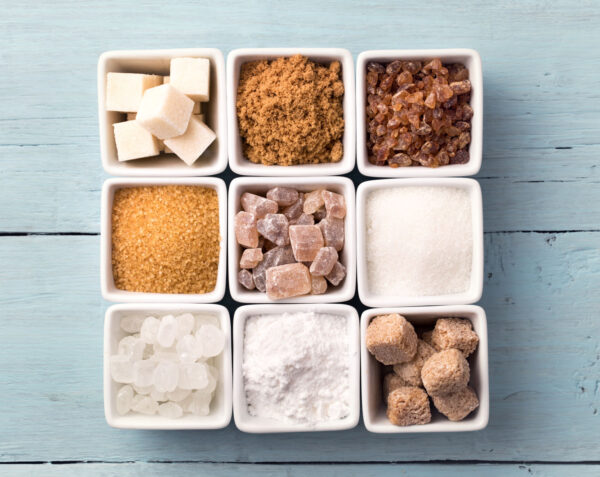In the realm of dietary recommendations, the US Department of Agriculture advises that the average American adult should cap their sugar consumption at a modest 1.4 ounces per day. However, starkly contrasting this guideline is the alarming reality that the typical adult in the United States consumes a staggering 156 pounds of added sugar annually. With mounting evidence highlighting the detrimental effects of excessive sugar intake on health, including obesity, tooth decay, and a myriad of potential ailments like heart disease, the pursuit of sugar substitutes has become increasingly prevalent.
Exploring Sweet Alternatives Diving into the Options
Xylitol: A Dental-Friendly Option with Natural Origins
Derived from corn, beets, and other natural sources, xylitol stands out as a sugar alcohol boasting properties that inhibit plaque-causing bacteria, rendering it an ideal choice for sugar-free gum. Despite its sweeter-than-sugar taste profile, xylitol is only partially absorbed by the body, resulting in fewer calories. However, caution is warranted as excessive consumption may lead to gastrointestinal discomfort. When incorporating xylitol into baking, it’s advisable to use half the amount compared to sugar, ensuring a balanced outcome.
Stevia: Nature’s Sweet Gift with Rapidly Growing Popularity
Extracted from a South American herb, stevia has swiftly gained traction in the United States, available under various trade names such as Sweetleaf and Truvia. Remarkably sweeter than sugar yet devoid of calories, stevia offers a guilt-free alternative for sweetening beverages and culinary creations. Notably, its inability to cause spikes in blood sugar levels positions it as a favorable choice for individuals mindful of their glycemic index. However, it’s imperative to note that stevia may not yield desirable results in baking applications due to its unique flavor profile.
Sucralose: The Seamless Transition to Sugar-Free Delights
Sold under the prominent brand name Splenda, sucralose undergoes chemical modification to evade metabolism by the body, effectively replicating the taste and texture of sugar. This feature renders it an excellent option for sweetening beverages and baked goods alike, seamlessly integrating into diverse culinary endeavors without compromising on flavor. The versatility of sucralose makes it a staple in households seeking to reduce sugar intake while savoring the sweetness of life.
Aspartame: A Dessert Lover’s Delight with a Heat-Sensitive Nature
Present in popular products such as Equal and Nutrasweet, aspartame tantalizes the taste buds with its ability to impart sweetness to desserts and beverages alike. However, it’s essential to exercise caution when subjecting aspartame to heat, as it undergoes denaturation, rendering it unsuitable for baking applications. Despite this limitation, aspartame remains a beloved choice among individuals seeking to indulge their sweet cravings without the guilt associated with sugar consumption.
Agave Nectar: An Ancient Sweetener with Modern-Day Implications
Derived from the same succulent plant responsible for yielding tequila, agave nectar offers a tantalizing alternative to refined sugar. Boasting a sweeter-than-sugar taste profile, agave nectar requires less quantity to achieve desired sweetness levels, thereby potentially reducing overall caloric intake. However, its elevated fructose content raises concerns regarding its impact on metabolic health, prompting individuals to exercise moderation when incorporating agave nectar into their dietary regimen.
Navigating Sweetener Choices: A Critical Approach
In the realm of sugar substitute, it’s imperative to adopt a discerning mindset, recognizing that studies on these alternatives often bear the influence of vested interests, whether from manufacturers, competitors, or lobbyists. While governmental research endeavors strive for impartiality, the pervasive influence of corporate entities underscores the importance of approaching information with a critical eye. By evaluating data through a lens of skepticism and prudence, consumers can make informed decisions regarding sweetener selection, prioritizing their health and well-being above all else.
Embracing a Holistic Lifestyle: Beyond Sweet Substitute
In the pursuit of optimal health and vitality, the emphasis must transcend mere substitution of sugar with alternative sweeteners. Rather than attempting to replicate unhealthy dietary patterns with substitutes, individuals are encouraged to embrace a holistic approach to nutrition, prioritizing whole foods, hydration, and regular physical activity. By cultivating habits that nourish the body and nurture overall well-being, individuals can embark on a journey towards sustained vitality and fulfillment, transcending the transient allure of artificial sweetness.
Conclusion
In navigating the labyrinth of sweeteners, one must tread with mindfulness and intentionality, guided by a commitment to holistic wellness and informed decision-making. By exploring the myriad options available and evaluating their merits with discernment, individuals can curate a dietary regimen that harmonizes with their unique health goals and preferences. Ultimately, the pursuit of sweetness extends far beyond the realm of taste, encompassing the multifaceted dimensions of physical vitality, emotional well-being, and spiritual fulfillment. As we savor the sweetness of life’s journey, let us embrace a path guided by balance, moderation, and an unwavering commitment to nourishing our bodies, minds, and souls.
